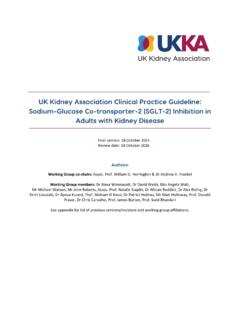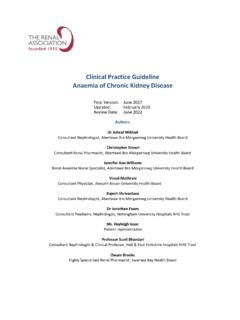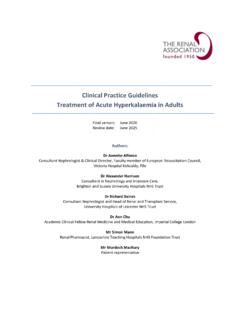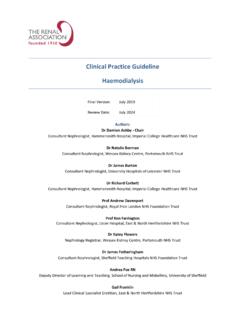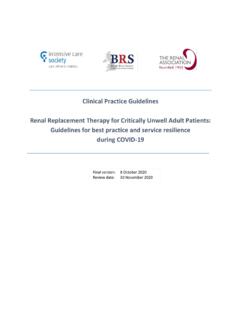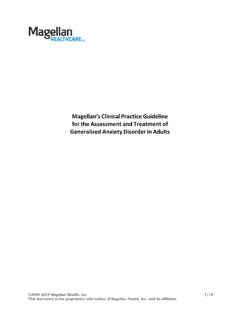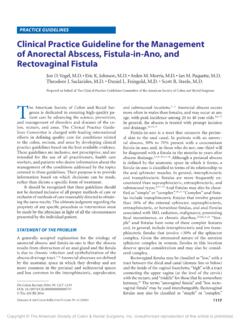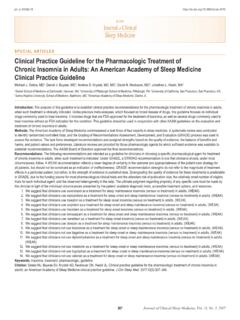Transcription of Clinical Practice Guideline Acute Kidney Injury (AKI)
1 Clinical Practice Guideline Acute Kidney Injury (AKI) Authors: Dr Suren Kanagasundaram Chair Consultant Nephrologist, Newcastle upon Tyne Hospitals NHS Foundation Trust Honorary Clinical Senior Lecturer, Institute of Cellular Medicine, Newcastle University Professor Caroline Ashley Renal Pharmacist, Royal Free Hospital Dr Sheetal Bhojani Consultant Paediatrician with Special Interest in Nephrology, University Hospital Wishaw, NHS Lanarkshire Ms Alma Caldwell Patient representative Dr Timothy Ellam Consultant Nephrologist, Newcastle upon Tyne Hospitals NHS Foundation Trust Dr Amrit Kaur Consultant Paediatric Nephrologist, Royal Manchester Children s Hospital Dr David Milford Consultant Paediatric Nephrologist, Birmingham Children s Hospital Dr Chris Mulgrew Consultant Nephrologist, Royal Devon and Exeter NHS Foundation Trust Dr Marlies Ostermann Consultant in Critical Care and Nephrology, Guy s and St.
2 Thomas NHS Foundation Trust Final Version: August 2019 Review Date: August 2024 Renal Association Clinical Practice Guideline Acute Kidney Injury (AKI) - August 2019 2 Endorsements The National Institute for Health and Care Excellence (NICE) has accredited the process used by the Renal Association to produce its Clinical Practice guidelines . Accreditation is valid for 5 years from January 2017. More information on accreditation can be viewed at Conflicts of Interest Statement All authors made declarations of interest in line with the policy in the Renal Association Clinical Practice guidelines Development Manual. Further details can be obtained on request from the Renal Association. Acknowledgements This document has been externally reviewed by key stake holders according to the process described in the Clinical Practice guidelines Development Policy Manual.
3 Renal Association Clinical Practice Guideline Acute Kidney Injury (AKI) - August 2019 3 Table of Contents 1. Introduction .. 4 2 Summary of clinicial Practice guidelines .. 6 3. Summary of audit measures .. 14 4. Rationale for Clinical Practice guidelines .. 20 5. Appendix 1 .. 113 6. Appendix 2 ..119 Renal Association Clinical Practice Guideline Acute Kidney Injury (AKI) - August 2019 4 1. Introduction These guidelines cover the prevention, detection, management and follow-up of Acute Kidney Injury (AKI) in adults, children and young people in both primary and secondary care and targets health care staff and organisations involved in the delivery of this care as well as relevant patient groups.
4 It excludes the neonatal population and adults at risk of contrast nephropathy, for whom joint guidance already exists [1]. In the context of UK Practice , our document joins Clinical guidelines from the National Institute for Health and Care Excellence (NICE CG 169) [2] and the extensive resources of the Think Kidneys programme ( ) . The view of the Guideline development group was that the present work should be complementary rather than contradictory, bridging the gap between the predominantly practical approach of Think Kidneys and the evidence-driven methodology of NICE and seeking to harmonise available guidance. The final scope for the present guidelines was confirmed after posting of a preliminary draft on the Renal Association website between 20th December 2016 and 28th February 2017.
5 Literature search terms were then defined, as detailed in appendix 1, but, briefly: The generic, AKI literature was first identified using various Medline search terms to capture varying nomenclature for the condition before further refinement according to topic. The historical reach of the searches was limited to 2011 based on the assumption that most current evidence would have been available for: 1. The 5th edition of the UK Renal Association Clinical Practice Guideline [3], which the present Guideline updates and which was finalised on 8th March 2011 2. The KDIGO Clinical Practice Guideline for Acute Kidney Injury [4], published in 2012, which included a detailed and comprehensive search strategy [5] Preliminary searches were run during 2017 but were then updated in April and May 2018, with a final review of key, emerging evidence undertaken by group review between April and August 2019.
6 The formal literature search was supplemented by review of the Cochrane Database of Systematic Reviews and of other national / international Clinical guidelines on AKI. Each topic area was reviewed by one or more adult nephrology authors (SK, CM, TE, MO, CA), all three paediatric authors (DM, AK, SB) and the Guideline s lay co-author (AC). Guideline recommendations were formulated at a series of Guideline development group conference calls through collective agreement without the need for group voting, the casting vote or final decision of the Chair (SK) or escalation to the Renal Association Clinical Practice Guideline Committee Chair. The strength of individual recommendations was defined according to the Modified GRADE system as described in the Renal Association s previous Guideline development policy manual [6].
7 Audit measures were chosen either based on their ease of automation ( daily renal function monitoring following AKI detection) or, where individual case note review was deemed to be unavoidable, by identifying a single audit population across which several different measures could be assessed. Where possible, the Guideline development group sought to identify individual measures that might represent broader, AKI care processes ( documentation of differential diagnoses of newly detected AKI episodes). The first draft of the Guideline was posted on the Renal Association website on January 2019. The draft Guideline was also circulated amongst key stakeholder organisations, comprising: Kidney Care UK The National Kidney Federation The Think Kidneys programme The Intensive Care Society The Association of Clinical Biochemists The Society of Acute Medicine The British Association of Paediatric Nephrologists Renal Association Clinical Practice Guideline Acute Kidney Injury (AKI) - August 2019 5 The British Renal Society The Royal College of General Practitioners The Faculty of Intensive Care Medicine The Royal College of Physicians of London The Royal College of Physicians of Edinburgh The Royal College of Physicians and Surgeons of Glasgow The group would like to express their gratitude to Dr.
8 Nikita Agrawal (Renal StR) and Dr. Rajib Pal (GP, Birmingham) for their input into the preliminary stages of Guideline development. References 1. Prevention of Contrast Induced Acute Kidney Injury (CI-AKI) In Adult Patients [ 2. NICE: Acute Kidney Injury : Prevention, detection and management of Acute Kidney Injury up to the point of renal replacement therapy. In: NICE Clinical Guideline 169. National Institute for Health and Care Excellence; 2013. 3. Lewington A, Kanagasundaram S: Renal Association Clinical Practice guidelines on Acute Kidney Injury . Nephron Clin Pract 2011, 118 Suppl 1:c349-390. 4. KDIGO: KDIGO Clinical Practice Guideline for Acute Kidney Injury . Kidney International Supplements 2012, 2(1). 5. KDIGO Clinical Practice Guideline for Acute Kidney Injury , Online Appendices A-F [ ] 6. Mactier R: Renal Association Clinical Practice Guideline development policy manual.]
9 Nephron Clin Pract 2011, 118 Suppl 1:c13-25. Renal Association Clinical Practice Guideline Acute Kidney Injury (AKI) - August 2019 6 2. Summary of Clinical Practice guidelines 1. Definition, Epidemiology and Outcomes Guideline - Adults and Paediatrics We recommend that the Kidney Disease: Improving Global Outcomes (KDIGO) system for the diagnosis and staging of AKI should be adopted; serum creatinine-based criteria should be applied according to the current NHS England biochemical detection algorithm. (1B) We suggest that, when the true, reference serum creatinine (SCr) is uncertain, the presence of an active episode of AKI occurring in secondary care can be inferred from frequent SCr testing ( at 12 and 24 hours after the index value). (2D) 2. Recognition of the patient at risk of AKI Guideline - Adults and Paediatrics (unless otherwise stated) We recommend that: patients at risk of AKI should be identified by the most appropriate risk factor profile for that population or, where no specific risk factor profile exists, through Clinical judgement and recognition of generic risk factors for AKI; in this way, appropriate preventative measures may be instituted as early as possible (1C) in-patients deemed at high risk of AKI should be closely monitored for AKI, particularly if there has been a new exposure.
10 Urine output should be monitored and serum creatinine tested daily (for adults) or regularly (for paediatric patients, reflecting the potential burden of venepuncture) until at least 48 hours after the period of increased risk has elapsed (1D) out-patients deemed at high risk of AKI should be closely monitored for AKI if there has been a new exposure. This should include regular monitoring of the serum creatinine until at least 48 hours after the period of increased risk has elapsed. For paediatric patients, monitoring should be undertaken by secondary care but may be in an out-patient or in-patient setting depending on Clinical circumstances (1D). 3. Clinical Assessment History, Examination Guideline Adults and Paediatrics (unless otherwise stated) We recommend that: all patients with AKI have an appropriate history and examination performed to help determine the cause of the episode of AKI.
